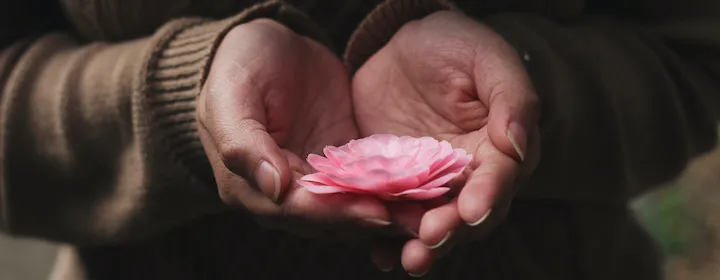One of the most pervasive causes of suffering is the way that we tend to be unkind to ourselves. We carry around within us messages of unworthiness. We think we need to be perfect in order to be loved. We over-strive for success because deep down, there is a sense that only by achieving can we quiet the voice of unworthiness – for a little while. We emphasize our own flaws and miss all the gifts we bring into the world. We believe that if someone else feels hurt, that it is our fault, or we may get angry with them to cover over our own sense of guilt. We are afraid to take risks, for fear that if the outcome is not what we want, we will self-attack emotionally.
Much of our self-loathing gets covered over. We develop ways of being in the world that mask our subconscious wounds. We develop angry personas or happy personas or controlled personas or confident personas. Yet behind these masks we put to the world, most of us carry within us messages of unkindness. These messages are like internal thorns; we have learned to live with them, but they take a lot of our energy to live with.
These stored messages tend to be very old. I like to say that most of our negative core beliefs were downloaded into us, like programming, when we were young, before we had any virus protection. These messages were downloaded by people who did not know any better – they may have acted like they knew better, but they were fumbling around, just like the rest of us. That makes the beliefs familiar, but it does not make them true.
Mindfulness and meditation help us to untangle from these negative core beliefs, to start removing the thorns from our psyches. There are many different practices that will help foster kindness for ourselves. Not all practices will be effective for everyone; we go in the doors that are open to us. It is also important to remember that these practices require repetition. It takes time, typically months or years, for self-kindness to fully take hold. Nevertheless, we can watch the progress of becoming gradually kinder to ourselves and celebrate that progress.
A few practices that can help are:Lovingkindness meditation: Here we practice directly offering ourselves lovingkindness, either in words or in attitude. Whatever we tell ourselves over and over, or whatever attitude we practice repeatedly sinks in over time. We might tell ourselves repeatedly, “May I be at peace. May I know joy. May I be truly kind to myself.” We might offer ourselves gestures of kindness, such as placing an open hand over the chest and sensing the warmth of that hand seeping into the chest toward the heart. We might imagine someone who is loving in our presence and see ourselves through their eyes. Ultimately, lovingkindness becomes a felt sense in our bodies.
Bringing self-critical thoughts into consciousness: As long as we are only dimly aware of our self-critical talk, it has all the power. Only when we deliberately bring these thoughts into direct consciousness can we begin to evaluate them and start to untangle from them. We can start by noticing what we feel like when we really believe the thoughts. We can imagine what we would be like if we did not have these beliefs. We use the felt sense in our bodies to help us to move beyond these self-critical thoughts. It can be helpful to realize that most of our self-critical beliefs started when we were young, which means they are a naïve way of thinking – probably developed as a way to protect our sensitive emotions at that time. This means we may be able to hold our critics with kindness, knowing they are trying to protect us, albeit in an unskillful way.
Reparenting: The emotional hurts, wounds, fears that we have experienced in our lives stay with us until they are released. These are the psychic thorns we carry around with us. One way to remove some of these thorns is to meditate on imagining ourselves as loving parents for our young selves. As we develop a relationship with our inner younger selves, we start to nurture them in a way that our actual parents could not, for whatever reason. We find ways to love or protect or guide our young selves, so that they start to feel safer, more secure, loved, and more confident. As our young selves feel a greater sense of well-being, that well-being transmits to our adult selves as well.
As we cultivate self-kindness, the benefits overflow. We start finding ourselves kinder to our loved ones, our communities, to those we are challenged by. We start to create an aura of kindness around us, ultimately to the benefit of all beings. Cultivating deep self-kindness may be challenging work, but ultimately it may one of the most important practices we engage in.
The upcoming Tending and Befriending – Cultivating Self-Kindness Retreat (September 3-5, online) will explore these practices.



